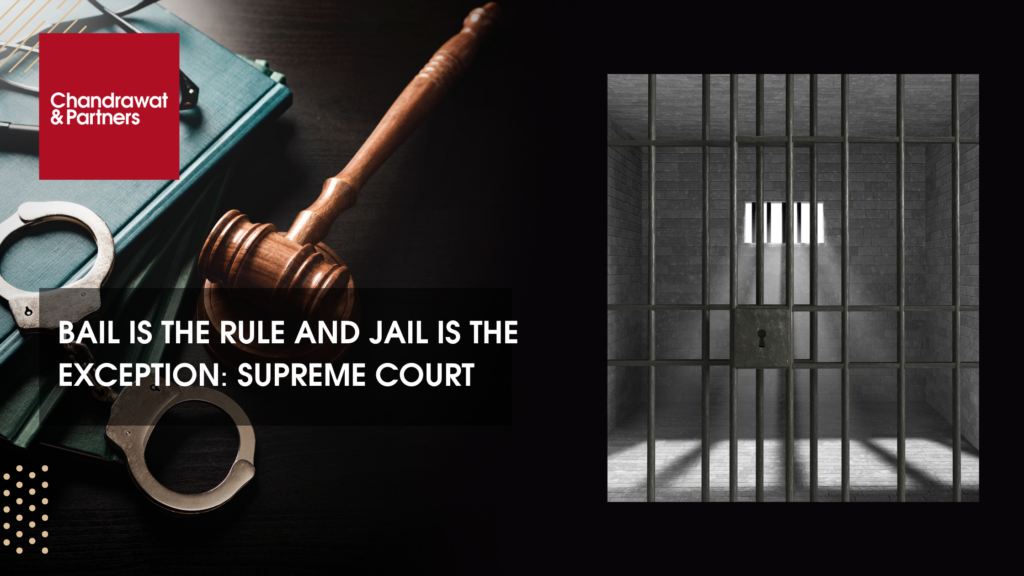Home > Recent Judgements >Bail Is The Rule & Jail Is The Exception: Supreme Court
August 30, 2024

BACKGROUND
In the case between Prem Prakash v. Union of India through the Directorate of Enforcement, the matter at hand involves the commission of fraud and laundering of money regarding how one acre of land was illegally acquired in Ranchi, India. This led to complaint being lodged and to the filing of an Enforcement Case Information Report (ECIR) under PMLA. In allowing this to happen, it is said that Respondent purporting to act under a power of attorney which was in truth, a sham, executed a sale deed in favour of Respondent over the land. Thereafter, this property was acquired by Respondent at a greater monetary value, from the last mentioned. These benefits were acquired through selling chain to various bank accounts linked or ending up to one firm owned by the appellant, Respondent. The state accuses Respondent of being the mastermind behind these financial dealings, using his ties to officialdom to have the property mutated illegally. Statements of statement and call records of the co-accused are cited against him.
ISSUE
Whether statements recorded by the same/not necessarily the same/threatening agency (in this case, the Enforcement Directorate) while the person is already in detention for some other offense can be adopted in accordance with the Act of Section 50 of the PMLA even when the person has not been arrested and is not placed as an accused in the new case.
JUDGEMENT
Leave Granted
In the present case, the statement of the appellant if to be taken as such, prima facie, it would amount to self-incrimination against the maker, will be defeated by the operation of section 25 of the evidence act due to the reason that, the statement was made while the maker was in custody, in respect of separate proceedings instituted by the same Investigating Agency. Considering the implications of thoughts of an injury to justice posed by an application of recourse to such evil procedures by the prosecution, and with various logic we would come within the principles and the rules of law on the procedure for adduction of witnesses’ documents and admirals in judicial proceedings.
Having heard both sides, we have no doubt in taking it further that when an accused is, no matter in which case, in the custody of PMLA and that person issues any statement under Section 50 PMLA to the same Investigating Agency, that statement is rendered as illegal and cannot be used against the said person. The reason being that the person in custody is not considered to be the same in control of the rational thinking when the proceedings are being investigated by the same Investigating Agency. It would be very dangerous to admit such statements against the maker as he or she would render such worst action against the norms of equity and good conscience.
While granting bail to the accused in a money laundering case, a division bench said so. It is found that Section 45 of The PMLA at best states that the granting of the bail shall only be subject to the twin conditions and does not in any way interfere with the general jurisdiction that save in very special circumstances bail remains the norm. The Bench elaborated that as also restated in PMLA, bail is the rule and jail is the exception. Section 32 of the bench ordered that in the case of conviction under PMLA there is indeed a reverse burden of proof and for that reverse burden of proof under 24 to kick in the prosecution must prove at least the most fundamental of facts. In determining whether to grant bail, the bench considered that the petitioner had been imprisoned for a long time and that there were many witnesses causing long delays in the trial. Also allowing the petitioner’s appeal against the order of the Jharkhand High Court which had refused to grant his bail.
ANALYSIS
Therefore, considering the facts and the fact that Articles 21 of the Constitution of India which is also accepted has some limitations in a democratic society, we hold that since the words ‘procedure established by law’ occurring in Article 21 cannot be such that it does not accord with reasonableness and validity. Because the appellant was being held in ECIR No. 4 of 2022 at the time, the statement made by the appellant in the case of violating any law provision specified under Section 50 could not be read during the adjudication or issuance of ECIR No. 5 of 2023.
The appeal is granted and impugned order dated 22.03.2024 is quashed and set aside.
The authority of the trial court as to the grant of bail to the appellant is exercised and it is ordered that the appellant shall be released in connection with ED Case No. ECIR No. 5 of the year 2023 on preferential bail on execution of bail bonds of Rupees 5 lakhs with 2 sureties of similar amount.
The appellant shall surrender his passport with the Trial Court and the appellant shall report to the Investigating Officer on every Monday and Thursday between 10 and 11 A.M.
The appellant shall not make any attempt to influence the witnesses and tamper with the evidence.
For more information or queries, please email us at
enquiries@chandrawatpartners.com




